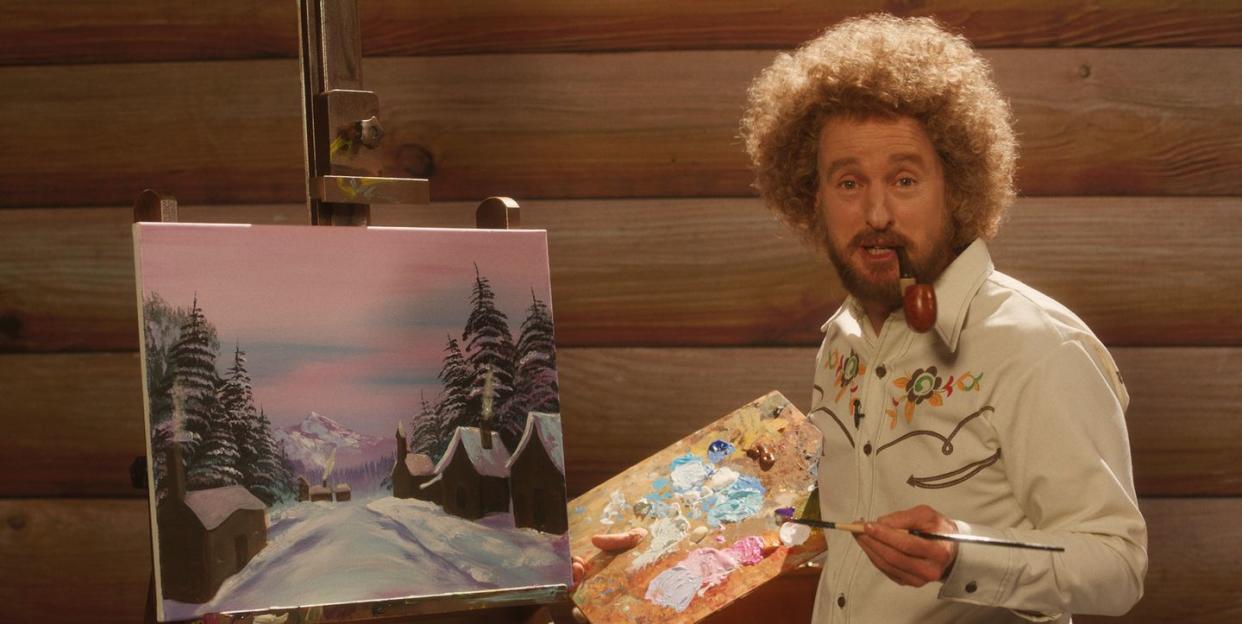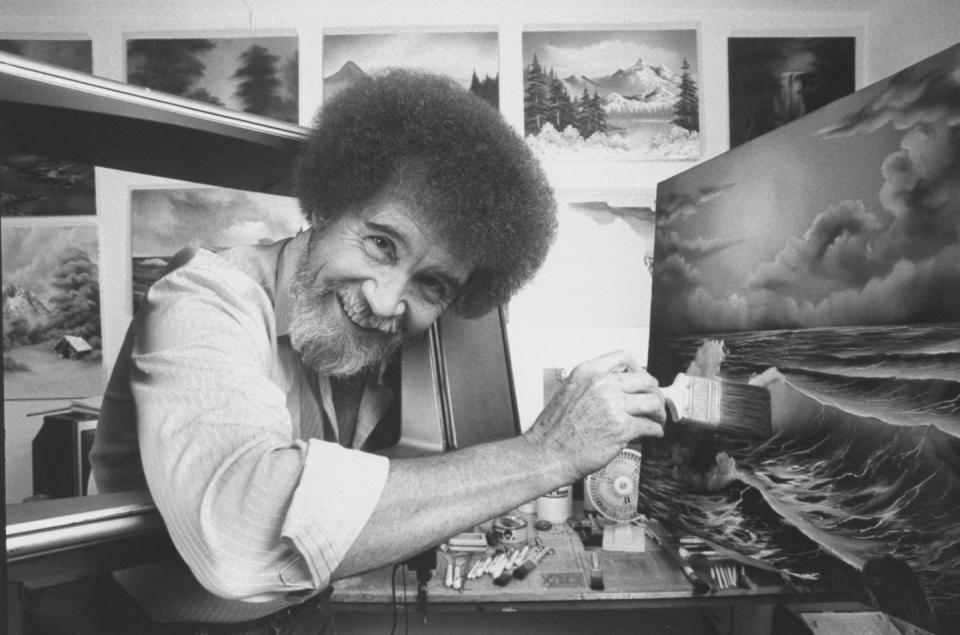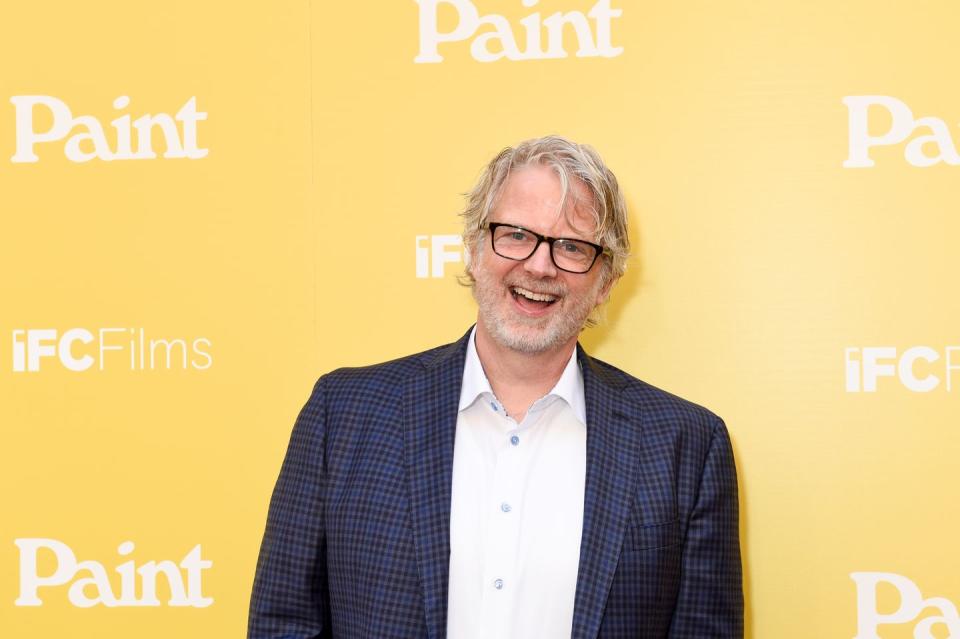Is the New Movie “Paint” Really about Bob Ross?

- Oops!Something went wrong.Please try again later.
Fans of beloved painter Bob Ross might think actor Owen Wilson looks familiar in his upcoming film Paint. With his perm and soothing voice, Wilson is a dead ringer for Ross as he teaches television audiences how to paint beautiful nature landscapes exactly like those that Ross created on his popular PBS series The Joy of Painting.
But when Wilson’s character introduces himself in the movie preview, the name he uses isn’t Bob Ross. It’s Carl Nargle. So what’s going on here? Is Wilson playing Ross in this movie or not? The answer is… not exactly.
Paint, now out in theaters, tells the fictional story about the host of a popular Vermont public TV painting show who finds his perfect life upended when a new, younger painter (played by Michaela Watkins) starts to steal the spotlight away from him.
Although Owen’s look and performance were clearly inspired by Ross, the story itself is complete fiction and was not inspired by anything from Ross’ real-life, according to director Brit McAdams, who wrote the script more than 13 years ago and has spent years collaborating with Wilson on the story and character.
“I just like the idea of this person who speaks softly and has such a power over people,” McAdams told Variety. “And how much you could conceivably get trapped in that persona as you got older. And if the world’s changing and you’re not, what eventually you lose because you’re not changing.”
The Real Bob Ross

Ross discovered oil painting while enlisted in the U.S. Air Force in the early 1960s. After his military service, he began studying the “wet-on-wet” technique that allowed him to produce complete paintings in less than an hour. He began teaching friends and colleagues the painting style, and he debuted his instructional series The Joy of Painting on PBS in 1983.
The show ran for more than a decade and attracted millions of viewers. Ross became known for his distinctive perm, light humor, and gentle demeanor, as well as his catchphrases like “happy little trees” and “We don’t make mistakes, we just have happy accidents.”
Ross died of lymphoma in 1995, at age 52, but his show has since found a new generation of fans in the digital age. His old television episodes remain popular on YouTube, and his official account on the live streaming service Twitch has more than 2 million followers.
Ross’ life and legacy weren’t without its scandals, including alleged extramarital affairs and disputes over ownership of his company after his death. But McHenry said the story in Paint has nothing to do with anything from Ross’ actual life.
“It’s funny,” McAdams told MovieMaker. “When I wrote it, Bob Ross really wasn’t a thing… Bob Ross wasn’t sort of part of the zeitgeist or anything. So it’s been really odd to see him have this resurgence.”
The Story Behind Paint

Still, there’s no doubt the look and personality of Wilson’s character was inspired by Ross. McAdams’ script was on the 2010 Black List, an annual survey of most-liked film screenplays not yet produced, and the official Black List description of the script even described the protagonist as “a Bob Ross–esque PBS painting show host.”
McAdams was partially inspired to write Paint because he grew up watching The Joy of Painting during his childhood, when PBS was one of the few things he was allowed to watch. In an interview with MovieMaker, McAdams recalled coming across Ross while flipping through television channels and initially feeling amused and perplexed by his unusual hair and look.
“He would just take this brush stroke, so quietly… just this brush stroke down, and the next strokes, and all of the sudden, you’d have like a mighty oak or an evergreen,” McAdams said. “You would go from sort of laughing at this… and then by the end, you’d be so transfixed, and everything would be so quiet, and the power that he had over us was all encompassing.”
The story in Paint was also inspired by McAdams time working for the VH1 cable network during his 20s, where he would often see celebrities whose behind-the-scenes behavior often clashed with their more positive, carefully cultivated public image, according to Variety.
“What if an artist, someone like a Bob Ross, had a lot of power but didn’t use that power for good?” McAdams said in The Hollywood Reporter. “What if that person, seemingly the nicest, most polite person on TV, maybe even the world, was not what they seemed when cameras stopped rolling?”
Owen Wilson’s Ross-Like Character

Although Wilson certainly channels Ross in his performance, the actor told Variety he wasn’t seeking to do an exact impression: “I’m not good at doing imitations, and so that was never really a possibility. But certainly that quality that he had when you watched that show—and why people still do—is like a little spa treatment or something. You come out like, ‘Oh, I feel relaxed, and I feel better.’”
When Wilson was growing up, his father, Robert A. Wilson, ran a PBS station in Dallas, where he was responsible for hiring Jim Lehrer and creating a television series that became the precursor to NewsHour. So Owen said he was familiar with the soft-spoken, intellectual tone of public television found in the Paint script.
Wilson also tried his hand at a little painting in preparation for the role, but it was the costume and wig that really started bringing the character of Carl Nargle together: “One of the big things for me came when they got the look dialed in with the wardrobe. And, I mean, let’s be honest, the wig does a lot of the heavy lifting for me in terms of feeling not like myself.”
In addition to Ross, the look of Carl Nargle was partially inspired by folk singer-songwriter Gordon Lightfoot. But the voice is all Ross, according to Wilson: “When you watch those Bob Ross shows, there’s just something very attractive and welcoming about the way he sounds and the stuff he’s saying.”

